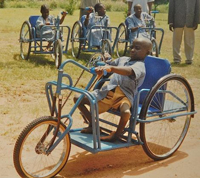West Side Presbyterian Church’s semi-retired pastor Ron Rice is dedicated to giving a lift, both spiritually and physically, to Nigerians afflicted with polio, a paralyzing non-curable disease. Nigeria has half the population of America, and more polio cases than any other nation.
With the encouragement, and donations, from his congregants and others, Rice has organized the Nigerian Wheelchair Ministry. A ministry, perhaps, but his operation seems to be more of a bicycle shop on the surface. It is located in Jos, a city of over half a million in Northern Nigeria.
There, 20 paid workers reconfigure bicycle parts shipped from India with steel tubing they weld on site into what some might call hand-cranked three-wheeled bicycles. The operator both peddles and steers by hand. Rice simply calls them wheelchairs, as they enable polio victims to bike to school who otherwise barely walk.
“Tens of thousands of Nigerian polio victims, children and adults, spend their lives crawling on the ground,” said Rice, 72, whose ministry has so far delivered 2,600 wheelchairs for free to people in Jos and villages further north in predominantly Muslim areas. He said they have good traction and ride well on dirt roads. Rice has traveled to Nigeria 15 times and returns each October.
“Nobody has taken an accurate census of those with polio because most victims are hidden away,” he said. “Their relatives consider them a burden. The children aren’t going to school unless someone carries them, so they don’t go. They can’t amount to anything generally.”
Ron’s father, Barrie, taught high school at Franklin and West Seattle. He said his mother, Virginia, was very beloved at Genesee Hill School where she taught 4th and 5th grades.
Rice attended Lafayette, Madison, and West Seattle High School, then Presbyterian Church (U.S.A.)-related Whitworth College in Spokane, WA. He graduated from Princeton Theological Seminary in 1961 and was ordained by Seattle Presbytery at West Side church. He earned his doctorate from San Francisco Theological Seminary. He became a world traveler and official photographer for the PC(USA) nationally.
“My only fear going to Nigeria is driving on the highway,” said Rice. “They drive 70 to 80 miles per hour, and passing three abreast on a two-lane road is not at all uncommon. I pray a lot on the highway.”
Polio was close to be being eradicated in 2003 through a worldwide vaccination effort. Progress stopped as clerics in Northern Nigeria spread rumors that the polio vaccine made Muslims infertile and spread AIDS. Vaccination programs halted as a result.
Last January Rotary International, the Bill & Melinda Gates Foundation, and the British and German governments committed more than $630 million in new funds to eradicate polio through vaccines in Nigeria, India, and other nations where the Nigerian strain of the disease is suddenly appearing.
“The really sad thing is nobody is doing anything about these victims who already are afflicted,” said Rice. “I was Rotary president in Centralia (Washington) and what Rotary has done is commendable. It has raised hundreds of millions of dollars to fight polio. But our ministry’s focus is on those suffering with polio now, and helping these people become mobile and educated.”
Rice has a Nigerian partner in the wheelchair ministry, Ayuba Gufwan, who he greatly admires. They met at a teacher’s conference in Nigeria. Gufwan’s legs are severely paralyzed from polio. Thanks to an old wheelchair his uncle built him at age 19, he returned to 4th grade and continued on to high school and then to a college of education. He is now a graduate of the Law Faculty of the University of Jos and works full time managing the wheelchair ministry in Nigeria, while Rice raises the funds here in the US. Gufwan recently married and has a young son and daughter.
Rice and Gufwan’s hand-cranked wheelchairs cost $150 to make. The ministry also distributes free walking canes to the blind that Rice takes on his flights over by the hundreds.
“One condition giving wheelchairs is that the kids have to go to school,” said Rice. He emphasized that while it is his hope that Muslims there convert to Christianity, there is no "hard sell," no Christian sermons given to Muslim wheelchair recipients, and, he added, “obviously not in a mosque where the wheelchairs are distributed.
“We give Bibles to Christian recipients, but not to Muslims,” he said. “Direct evangelism is not going to happen when you are in a Muslim context. A lot of Muslim communities have misconceptions about Christians, like they are a bunch of drunks who watch pornography. That’s why it blows their mind that Christians give them the free wheelchairs. It is an expensive gift over there.”
“Jesus tells us to go into the world to love our fellow person, and it’s the love that we are giving,” said Sharon, his wife of 49 years, who has traveled to Nigeria 10 times. “There are no strings attached. Love doesn’t have any attachments.”
“Jesus devoted as much time to healing as he did to preaching and teaching,” said Ron. “We’re trying to follow Jesus’ example. In the New Testament Jesus said to the paralyzed man, ‘Stand up ... and walk.’ We can’t do that, but the next best thing we can do is give them a wheelchair.”
To learn more about the project and watch a five-minute video, visit the Web site.

